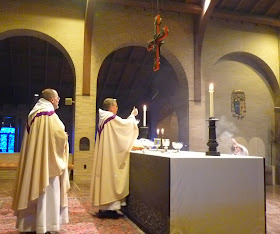Blessing is somehow built into the very
fabric of the universe and so into the very fabric of our lives. In the first chapter of Genesis it’s obvious that God calls forth
everything and everyone into existence and then affirms the goodness of it all.
And fundamentally that’s what blessing is. Whenever we bless in expressing
thankfulness for anything or anyone, we both recognize and strengthen a
goodness that’s there. And in so doing we participate in bringing it into being
and in generating more of it. This is most evident when parents bless their
children. For in doing so they both affirm and strengthen who they essentially
are and seek to call forth goodness from and for their future.
According to the story of creation, this
practice, this possibility of blessing comes from God who creates in order to
bless. God seeks the world’s goodness first by calling it forth: ‘Let there be
light’; and who acknowledges the world’s goodness by first recognizing it and
then strengthening it: ‘and God saw that it was good, and God saw that it was
very good’. Yes, blessing is truly built into the fabric of the universe. The poet
John O’Donohue says something similar: "Despite all the darkness, human hope is
based on the instinct that at the deepest level of reality some intimate kindness
holds sway. This is the heart of blessing. To believe in blessing is to believe
that our being here, our very presence in the world, is itself the…primal
blessing."
Everything deserves to be blessed and
received with gratitude. Offering thanks in the midst of tragedy and trusting
God to be God, is not a new idea at all. Actually 3000 years ago the Jewish
people formulated blessings, berakoth, for every circumstance in life.
If it were good news “Blessed be he who is good and does good.” If it were bad
news, “Blessed be the judge of truth.” As they viewed reality, human beings had
a duty to pronounce a blessing on the bad, as well as the good, because all
life came from God. The Talmud says, “It is forbidden to taste of this world
without a blessing.” Fr. Michael Himes will speak of the sacramental principle - “If something is always and everywhere the
case, it must be noticed, accepted and celebrated somewhere, sometime. What is
always true must be noticed as true at a particular time and in a particular
place.” Indeed God is always offering us times and
opportunities to bless and to be grateful. Nothing is too big, and nothing is
too small to evoke a blessing of gratitude.
And so Himes asks the question, “What can be
sacramental?” His response, “Anything. How many sacraments are there? As many
as there are things in existence in the universe. There are, of course, the
seven great communal sacraments, those seven special moments in the Church’s
life which the community has set apart as particular celebrations of God’s
grace. But all of us have personal sacraments: people, places or events which
speak to us deeply and richly of the love of God which we know surrounds us
always but of which we are not always aware.” Nothing is too small or
insignificant.
Photograph by Brother Anthony Khan. Meditation by Abbot Damian.














